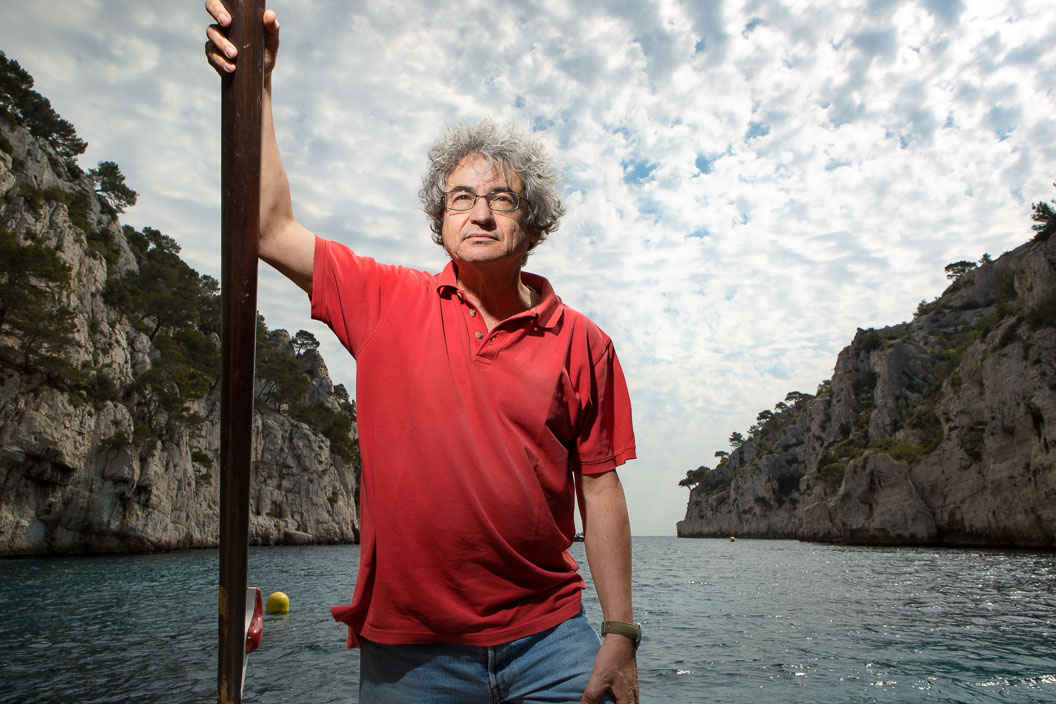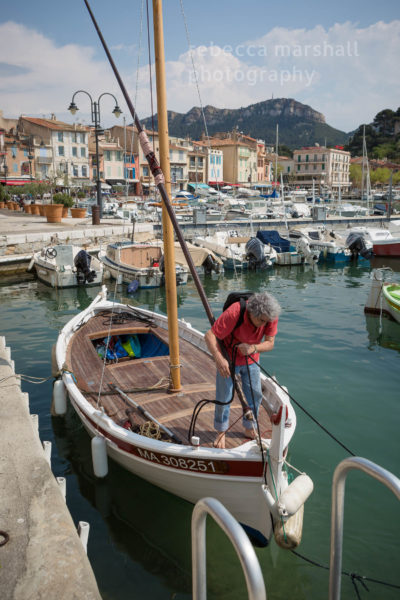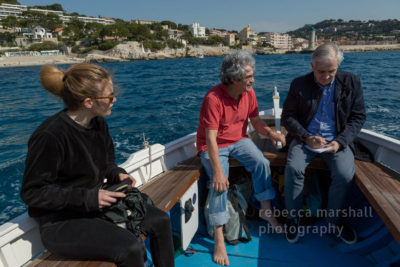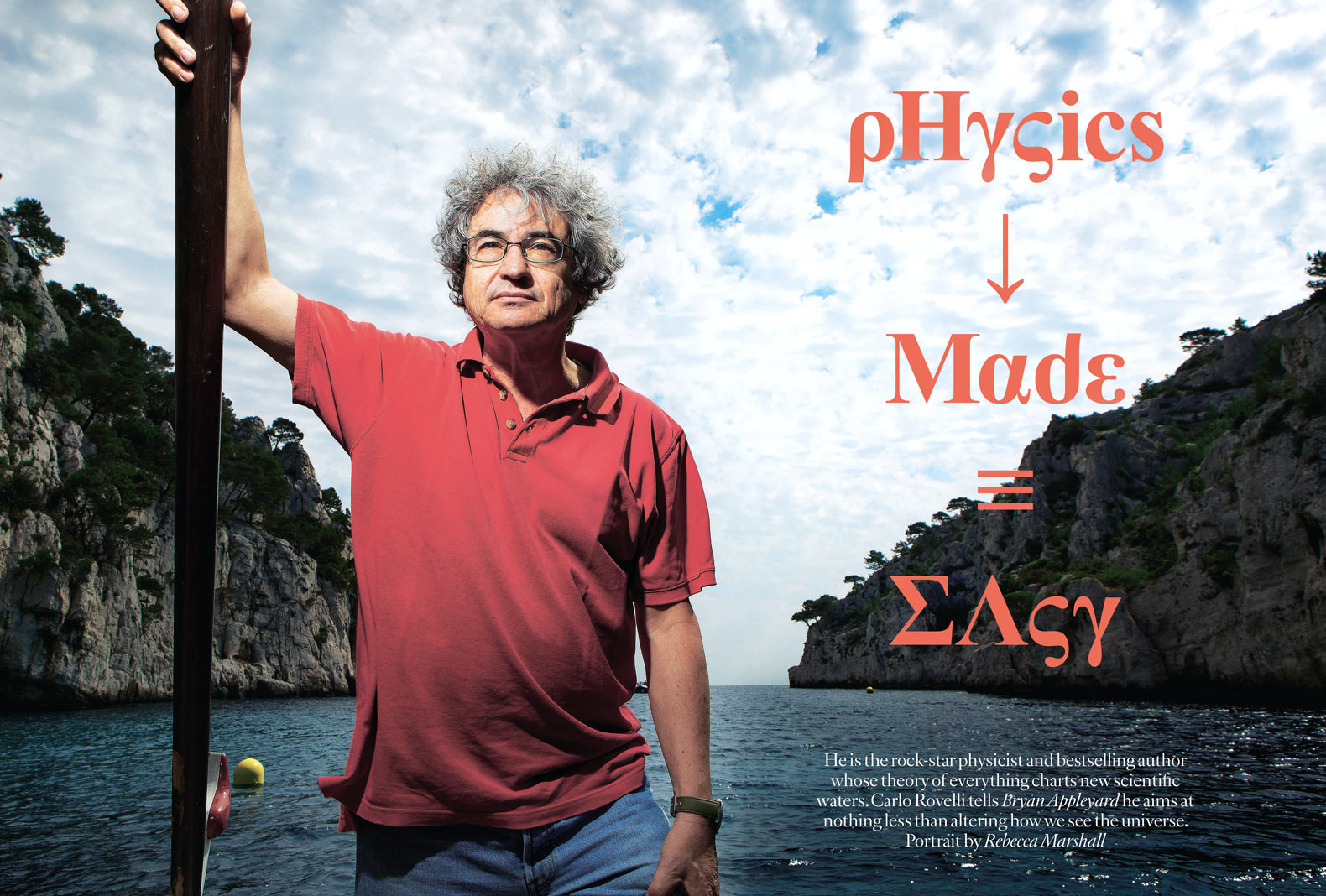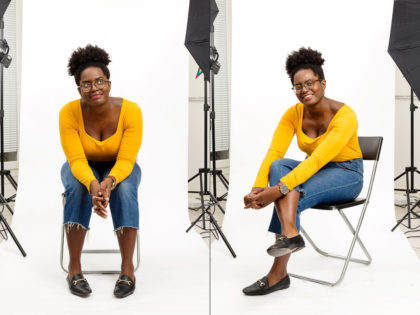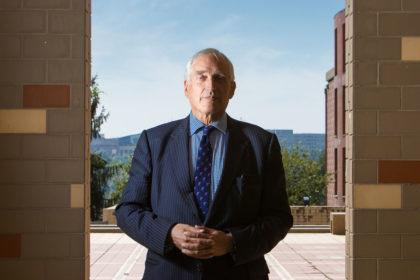The little boat lurched violently in the swell off the coast of Marseille. I hugged my photographer’s bag tightly, sheltering it from the sea spray and managing to keep it, for the moment, safe above the rising water level inside the boat. “Don’t worry, its not leaking too fast, we should make it back to port in time“, shouted Carlo, just above the noise of the wind. I was out at sea with a Sunday Times Magazine journalist, my assistant Lou and physicist Carlo Rovelli. A best-selling author, Rovelli is a specialist in black holes and the proud owner of a slightly dilapidated pointu fishing boat.
At home with a rock star physicist
We had met Carlo that morning at his apartment in Cassis, a picturesque port 30 minutes from Marseille. A softly-spoken, modest man, Carlo’s short book, Seven Brief Lessons on Physics, has sold more than 1 million copies worldwide. The South of France home of this (as the journalist coined him) ‘rock star physicist’ is a delightful treasure trove. On an initial glance, I took in a ceiling-high antique radio cabinet (“sadly it no longer works“), a sling shot (“all houses should have a weapon“), beautiful Belle Epoque furniture spilling books, a Totem pole and Isaac Newton-era bronze dividers.
Stepping out onto the terrace to admire Cap Canaille opposite (the highest sea cliff in France), I spotted a blackboard, covered in unintelligible chalk scribbles and equations. It transpires that Carlo is currently, in his free time, calculating the time it takes for a black hole to explode.
God, LSD and a little boat
It had been Carlo’s idea to take photographer and journalist out for a trip in his boat. When the photo editor had told me this, I assumed that we’d be spending the day aboard a French Riviera-style luxury motor yacht (where the boating experience would be softened by shag pile carpets, highly polished furniture and rough sea stabilisers). But I was delighted to be proven wrong. Carlo’s means of relaxation is his ‘pointu‘, a small, traditional fishing boat that was once seen everywhere across the Mediterranean (today a few can still be seen in Nice, Antibes and other harbours in the South of France).
Our destination was the Calanques, a national park between Cassis and Marseille. With its network of beautiful, fjord-like coastal inlets, the Calanques is said to be one of Provence’s hidden gems. The noise of the boat’s motor and fiercesome wind on the journey made it challenging to hear journalist Brian’s sterling attempts to conduct an interview, but I certainly enjoyed the view as I strained to hear what was being said. Carlos’s new book, ‘Reality Is Not What It Seems‘, was on the verge of publication and the Sunday Times Magazine was getting the lowdown. My grasp of physics is weak to say the least, but I was interested to hear Carlo’s rather unique life story. It made sense to me that LSD and mushrooms could play an important part at the start of a quantum physics career, and his rather controversial opinion that concepts of god and belief need not be entirely incompatible with a scientific view of the universe was refreshing. “You have to leave the rails to make your own life“.
Blue fish and micro particles
We finally dropped anchor in the clear turquoise waters of Calanque d’En-Vau, just as the sun was reaching its zenith. Brian seemed keen that I get the portrait done in order to return to more favourable interview conditions, but I hinted that hunger is not an ideal condition for a successful portrait (neither in the case of the subject nor this photographer). In need of no further encouragement, Carlo produced a penknife and bulging carrier bag with a flourish and as we fell on the fresh bread, Corsican cheese and tomatoes, he got into the nitty gritty of quantum theory. I dabbled a toe in the water and fed cheese rind to the enormous blue fish that rose from its depths, while the discussion about dark matter and loop quantum gravity (Rovelli was among the founders of the theory) swirled around my ears. Learning of the existence of quanta, particles that are a billion, billion times smaller than the smallest atomic nuclei, made me feel slightly giddy.
Mackerel sky
On a more practical level, however, I had my eye on the light conditions. The little boat, already a challenging place for a portrait due to the limited space, was turning in the wind, constantly changing my view and the sun’s angle. I was looking for something too…something extra. I wanted more weight in the background to this portrait than a picture postcard South of France scene, to better fit Carlos and his field.
All good things come to photographers who wait. Finally, as we set up for the portrait, Carlo (now happily fed) moving into position and Lou balancing gamely on the edge of the boat holding umbrella and flash, it happened. As we waited for the boat to swing round again, the sun suddenly lost its heat. In the strong wind, it had only taken a few minutes for a mackerel band of cloud to steal across the sky. What had been blue and flat before was suddenly darker, closer and deeper. A much more fitting background for a specialist in black holes.
